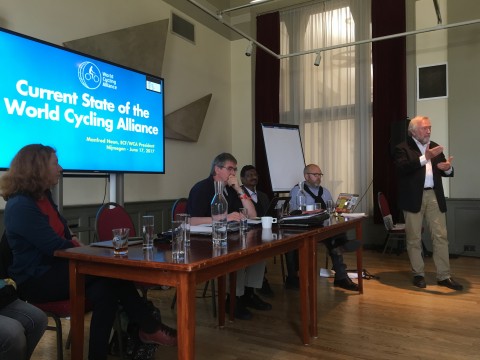
New Zealand was represented by advocacy body Cycling Action Network at a recent global meeting aimed at promoting cycling to advance the UN's Global Development Goals
Shipra Narang Suri of the UN told the Conference that the world is at an inflection point in development of cities. A majority of the world’s population now lives in built-up areas, so the UN sees that many cities are learning key lessons: Liveability and choice in transport are critical so that cities can function properly and give their citizens a better quality of life. Only carefully, meaningfully planned urbanisation can provide those qualities. Planning good cycle networks and infrastructure is a crucial part of that.
The UN's Global Development Goals are a set of eight goals to end poverty, protect the planet and ensure that all people enjoy peace and prosperity. Increases in cycling for transport have been shown by ECF to support these goals in many ways. The ECF -through its new World Cycling Alliance initiative- presented evidence to the World body creating Habitat 3 in Quito recently and succeeded in having cycling mentioned in the text of the new agreement. Cycling can contribute to the improvement of some major world issues: Improving womens’ mobility; improving lower-income mobility; reducing congestion and pollution. It's CAN's hope that we can help that contribution along in some small way. As the Alliance is just getting up and running, it's not fully clear yet what CAN's role or input will be.
What we do know is that the Alliance is set up to be a 'federation of federations' and will be constituted under Belgian law (ECF being based in Brussels). New Zealand is to be rolled into the Oceania region, whose delegate is currently Bike South Australia, represented by CEO Christian Haag.
More info at this link- https://ecf.com/community/world-cycling-alliance
